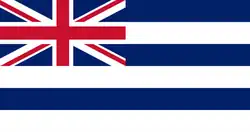Regency Commission
| Regency Commission | |
|---|---|
 | |
 | |
| Agency overview | |
| Formed | 1842 |
| Dissolved | 1846 |
| Superseding agency | Council of State |
| Jurisdictional structure | |
| Operations jurisdiction | Kingdom of Mosquitia |
The Regency Commission (1842–1846) was the provisional governing authority of the Kingdom of Mosquitia during the minority of King George Augustus Frederic following the death of his father, King Robert Charles Frederic, on 8 October 1842. The Commission was originally constituted by the King’s will in 1840 and functioned as the national regency until replaced by the Supreme Local Government and Council of State in 1846.
Background
In anticipation of his death and the minority of his heir, King Robert Charles Frederic issued a formal will and political settlement at the Government House, Belize on 25 February 1840. The will established a Regency Commission to administer the affairs of the kingdom. The will was signed and witnessed by officials including judges of the Supreme Court of Honduras and recorded by the Keeper of Records, H. Symons, on 26 February 1840.

The King entrusted his political authority to commissioners nominated by Colonel Alexander Macdonald, Her Majesty’s Superintendent at British Honduras, with the express approval of the British Crown. Colonel Macdonald was appointed guardian of the royal children and chairman of the Regency Commission.
Provisions of the Will
The will granted the Regency Commission:
- Full powers of regency and administration of the kingdom’s affairs.
- Authority to enact laws and issue resolutions under the sanction of Colonel Macdonald.
- Power to appoint successors or fill vacancies among the commissioners.
- Specific instructions to ensure that the United Church of England and Ireland be the established religion of the nation “forever.”
- Provision for the upbringing, education, and financial support of the royal children.
- An annual allowance to be provided to Queen Juliana (widow of King Robert Charles Frederic) from national revenues.
The document urged the British Crown to maintain its protection and friendship with the Mosquitian Nation, which had been a key element of its external diplomatic posture.
Transition of Authority
The Regency Commission initially operated under the chairmanship of Colonel Alexander Macdonald, overseeing both foreign relations and internal administration of the kingdom.
On 4 May 1843, the Colonial Secretary of British Honduras notified Mosquitian leaders—Prince Wellington, Colonel Johnson, and General Thomas Lowry Robinson Jr.—that the British government and commissioners had transferred the regency to them. This transition formally localized the Regency within the kingdom.[1]
- Prince Wellington represented the kingdom’s central precinct around King’s Cape (Cabo Gracias a Dios).
- General Thomas Lowry Robinson Jr., brother of Queen Juliana, became the principal figure in the Regency and maternal uncle to King George Augustus Frederic II.
During this period, King George Augustus Frederic II remained in Jamaica under British supervision, receiving his education and preparation for future rule.
The Robinson-Chavéz Treaty
On 16 December 1843, General Robinson, acting as Regent and head of the Mosquitian government, signed the Robinson-Chavéz Treaty (also known as the Convention of Friendship, Alliance, and Mutual Protection) with the State of Honduras. This was a significant diplomatic act asserting the kingdom’s independent foreign relations under the regency.
Dissolution
The Regency Commission effectively governed the Kingdom of Mosquitia until 10 September 1846, when King George Augustus Frederic, having reached the age of majority, issued a Royal Commission that established the Supreme Local Government of the Kingdom of Mosquitia and appointed the Council of State as the permanent governing body of the kingdom.
The creation of the Council of State formally abolished the regency and restored full sovereign authority to the monarch.
Legacy
The Regency Commission represents a unique example of a formal regency system in a partially sovereign indigenous monarchy under informal British protection. It blended indigenous leadership with British oversight, laying the groundwork for the later constitutional experiment of the Supreme Local Government and Council of State.
The Commission’s existence also illustrates the delicate balance of power and influence between the Mosquito Kingdom and the British colonial administration in Central America during the mid-19th century.
References
- ^ Burdon, Sir John Alder; Burdon, John Alder (1935). Archives of British Honduras ...: From 1841-1884. Sifton, Praed & Company, Limited.